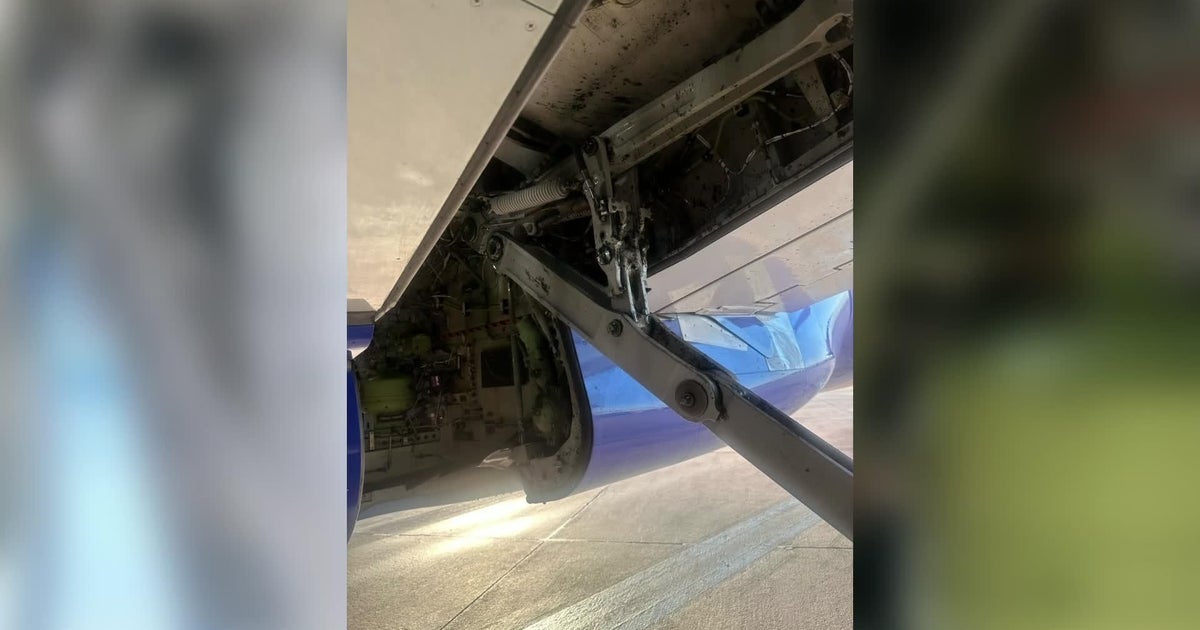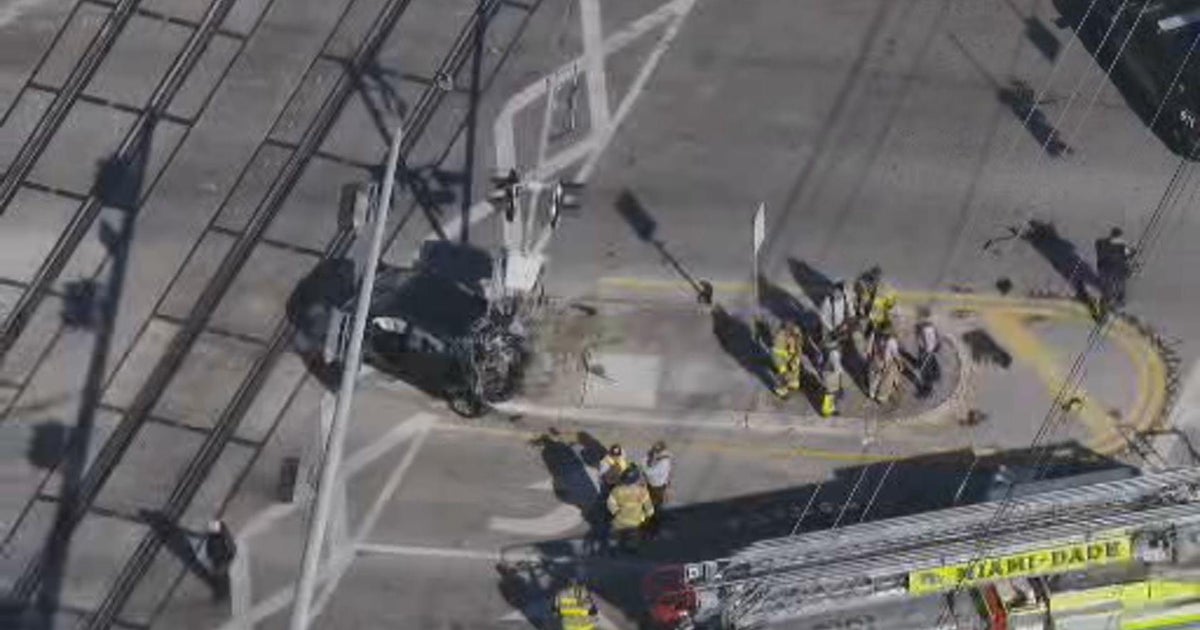"Baby Doc" Duvalier Returns To Haiti; S. Fla. Haitians Stunned
(MIAMI) CBS4 - Jean Claude Duvalier, the deposed former strongman of Haiti who has been living in exile for 2 decades, returned to his homeland without notice Sunday, drawing cheers from supporters and surprise from government officials. The reason for "Baby Doc"'s returning is not clear, but in the past he had offered his services to help resolve Haiti's problems.
The Reuters news service reported Sunday that Duvalier was met at the airport in Port-Au-Prince by enthusiastic supporters. CBS4 news partner The Miami Herald said about 2 thousand people gathered to see the former dictator. Duvalier, who has been living in exile in France, arrived on an Air France flight at 5:50 local time Sunday night. He wore a dark suit and blue tie, and was accompanied by his wife. He was taken into an immigration office before passing through customs.
"I'm waiting for instructions from the prosecutor," Mario Andresol, Haiti's police chief, told The Miami Herald outside the airport.
About two hours after the plane landed, Duvaliar, looking frail, left the airport in the back seat of an SUV, the Herald reported. The crowd cheered. Among those meeting him were members of his former government, according to the French language website "Haiti en Marche".
Gunshots and pepper spray were used by the national police in an attempt to keep reporters away from the airport. Tanks from the United Nations peacekeeping force were sent in to help keep order,
CNN Reports that The United Nations restricted the movement of its staff in Port-au-Prince until further notice, or until the impact of Duvalier's arrival becomes clear, said Patrick Hanson, a security officer for the United Nations in Haiti.
"(Duvalier) is happy to be back in this country, back in his home," said Mona Beruaveau, a candidate for Senate in a Duvalierist party who spoke to the former dictator inside the immigration office. "He is tired after a long trip."
Beruaveau said he would give a news conference on Monday.
Word spread quickly through the streets of Miami's Little Haiti, whom to thousands who fled the repressive regime of the Duvaliers. CBS4's Tiffani Helberg said people are wondering why there was no advance word from the government of France, which had allowed Duvalier to live in their country in exile, or from the government of the United States, which most people who spoke believed would have had to grant permission, or at least tacit consent, for Duvalier's return.
There was also great concern about why Duvalier had returned at a time of great turmoil for Haiti's citizens.
"This news fell on us like a brick," said Marliene Bastiene, a Haitian-American activist for former candidate for Congress. "Duvalier was in haiti. we are all in shock just when we thought it could never get worse in Haiti, it has gotten worse."
"We know that there is no way that Duvalier could get to Haiti without the approval of the French government and the US government," she said. "The question that we've been asking since 5 o'clock is why Haiti, why now?
In Haiti, in the refugee camps where tens of thousands live following the Haitian earthquake one year ago. people were uncertain what to think.
"I don't know much about Jean-Claude Duvalier but I've heard he did good things for the country," said 34-year-old Joel Pierre. "I hope he will do good things again."
Nearby, 42-year-old Marline Joseph, living in the camp with her three kids, was also somewhat hopeful. "He's here, that's good. Now, what is he going to do for the country."
Haitians danced in the streets in both Port-Au-Prince and in Little Haiti to celebrate the overthrow of Duvalier back in 1986, heckling the tubby, boyish tyrant as he was driven to the airport in a black limousine and flown into exile in France. Most Haitians hoped "Baby Doc" had left for good, closing a dark chapter of terror and repression that began under his late father, Francois "Papa Doc" Duvalier.
But a handful of loyalists have been campaigning to bring Duvalier home from exile in France, launching a foundation to improve the dictatorship's image and reviving Baby Doc's political party in the hopes that one day he can return to power democratically.
"We want him to be president because we don't trust anyone in this election. He did bad things but since he left we have not had stability. We have more people without jobs, without homes," said Haiti Belizaire, a 47-year-old Duvalier supporter in the crowd outside the airport.
Prime Minister Jean-Max Bellerive said that if Duvalier is involved in any political activities he is not aware of them.
"He is a Haitian and, as such, is free to return home," the prime minister said in an email to The Associated Press. Asked if Duvalier's presence could destablize the country, he said "Until now, there's no reason to believe that."
Duvalier has been living in Paris, but in an exclusive 2002 interview with CBS4 Chief investigative reporter Michelle Gillen, he made it clear he wanted to return to Haiti.
''This is my country. . . . I'm ready to put myself at the disposal of the Haitian people,'' he told Gillen, who also interviewed him in December 2002. "I think I'm getting close and that I will soon have the opportunity to go back to my country," he said in that interview.
See a timeline of Duvalier in Haiti
See the 2002 Michele Gillen interview:
Duvalier had gone so far as to request a diplomatic passport to facilitate his return in 2004, but it's not known if the Haitian government took action on the request. However, it was reported Sunday Duvalier arrived using some type of diplomatic passport.
In the fall of 2007, President Rene Preval told reporters that Duvalier could return to Haiti but would face justice for the deaths of thousands of people and the theft of millions of dollars.
In France, the deputy spokeswoman for the Foreign Ministry said she had seen news of Duvalier's arrival in Haiti, but had "no information" about the matter and could not confirm that he'd left France. The spokeswoman did not give her name, in accordance with ministry policy.
Duvalier's return Sunday comes as the country struggles to work through a dire political crisis following the problematic Nov. 28 first-round presidential election.
Three candidates want to go onto a second round. The Organization of American States sent in a team of experts to resolve the deadlock, recommending that Preval's candidate be excluded. Preval was reportedly not pleased with the report. OAS Secretary-General Jose Miguel Insulza was scheduled to be in Port-au-Prince to meet with Preval on Monday.



